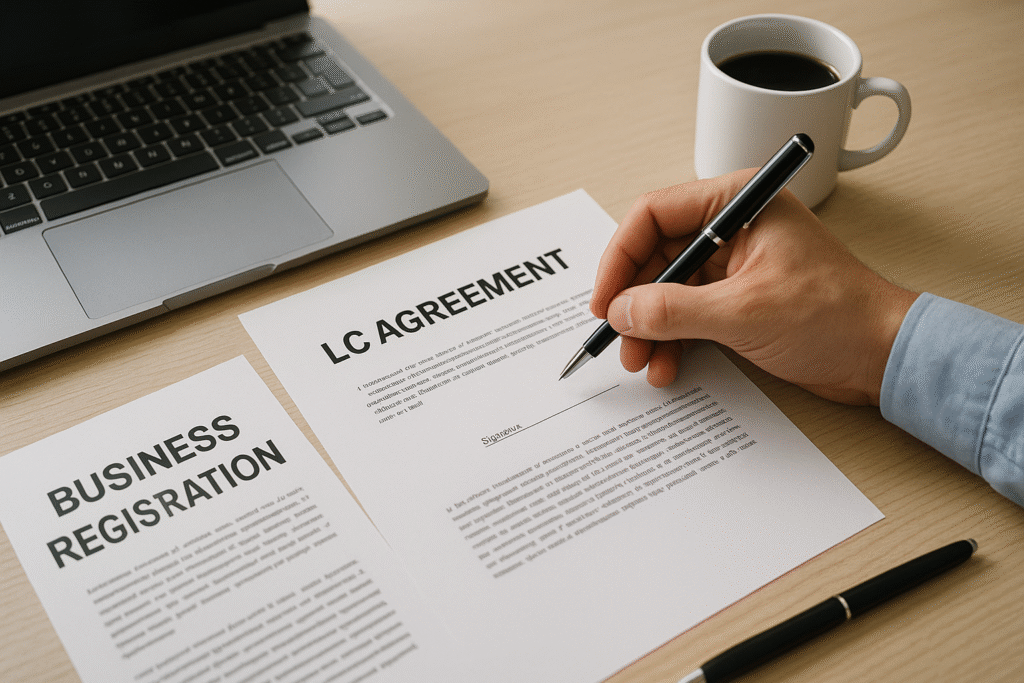LLC vs. Sole Proprietorship: The Ultimate Business Showdown
Starting your own business is one of the most exciting and sometimes confusing steps in your entrepreneurial journey. Whether you’re a freelancer, small business owner, or budding entrepreneur, one question always pops up first:
Should you start as an LLC or a Sole Proprietorship? 🤔
Both structures are popular choices, but they differ significantly when it comes to taxes, liability, and legal protection. A Sole Proprietorship gives you simplicity and control, while an LLC (Limited Liability Company) offers protection and credibility.
Choosing the right business structure can affect everything from your personal risk to your long-term profits. That’s why understanding the difference between an LLC and a Sole Proprietorship is so important before you take the plunge.
Table of Contents
Understanding Sole Proprietorship 🏠
A Sole Proprietorship (also known as sole prop, self proprietor, or individual proprietor) is the simplest business form. You own and control everything profits, decisions, and risks.
Because there’s no legal separation between the owner and the business, you personally bear all liabilities. For example, if your proprietorship business faces debt, your personal savings could be at risk.
According to the U.S. Small Business Administration, a Sole Proprietorship is ideal for freelancers, consultants, or small shop owners who want low setup costs and complete control.
What Is an LLC (Limited Liability Company)? 🧾

An LLC, or Limited Liability Company, is a formal business entity that separates your personal and business assets. This limited liability protection means your home, car, or savings stay safe if the business is sued.
There are many LLC types Series LLC, Domestic Limited Liability Company, Limited Liability Partnership (LLP) each with slightly different structures.
If you’re planning to start one, here’s a detailed guide on How to Form an LLC in the USA 🏢it walks you through state filings, fees, and ongoing requirements.
The IRS also provides official details on how an LLC is taxed essential reading before registration.
LLC vs. Sole Proprietorship: Key Differences ⚖️
Understanding the difference between an LLC and a Sole Proprietorship helps you choose the right foundation:
| Feature | Sole Proprietorship | LLC (Limited Liability Company) |
|---|---|---|
| Legal Status | No legal separation from owner | Separate legal entity |
| Liability Protection | None | Personal assets protected |
| Taxes | Pass-through (personal) | Pass-through or corporate option |
| Setup Process | Simple, minimal cost | Formal registration required |
| Longevity | Ends with owner | Continues beyond ownership |
💡 Pro Tip: Always consider your future plans if you expect growth, employees, or investors, the LLC or Sole Proprietorship question becomes critical.
How to Register for a Sole Proprietorship 📝
Getting started as a Sole Proprietor is straightforward:
- Pick a business name (verify availability).
- File a DBA (Doing Business As) if you’ll use a trade name.
- Obtain licenses or permits required by your state or city.
- Set up a business bank account to separate finances.
- Report income taxes using Form 1040 + Schedule C.
The official USA.gov Business Registration Guide provides state-by-state filing help so you can legally operate your Sole Proprietorship with ease.
Advantages and Disadvantages of a Sole Proprietorship 🌟
Pros
- ✅ Easy and inexpensive setup
- ✅ Full control over decisions
- ✅ Simple taxation process
Cons
- ⚠️ Unlimited personal liability
- ⚠️ Harder to raise capital
- ⚠️ Business ends if the owner retires or passes away
Still, many sole entrepreneurs choose this route for flexibility especially when testing ideas or freelancing.
Benefits of Forming an LLC 💼
Forming a Limited Liability Company (LLC) gives you:
- 🛡️ Asset protection: Business debts don’t touch personal property.
- 💰 Tax flexibility: Choose between sole prop LLC treatment or corporate taxation.
- 🤝 Credibility: Clients and lenders see you as a serious entity.
- 🔄 Scalability: You can easily add partners or investors (LLC Partnership).
To understand how taxes apply, read LLC vs Sole Proprietorship Taxes Explained from NerdWallet a trusted finance source.
Single Member LLC vs. Sole Proprietorship 🔍
A Single Member LLC and a Sole Proprietorship look similar both owned by one person but legally, they differ:
- The Single Member LLC enjoys limited liability and flexible taxation.
- The Sole Prop has simpler setup but exposes personal assets.
Many entrepreneurs begin as a Sole Prop and later convert to an LLC for protection an easy move supported by most states.
Taxation: LLC vs. Sole Proprietorship 💵

Both structures use pass-through taxation, meaning profits flow directly to your personal return.
However, an LLC lets you elect corporate taxation to lower self-employment taxes a feature unavailable to Sole Props.
The IRS Business Tax Center provides clear guidance on these tax elections.
Want to stay compliant with upcoming 2025 tax reporting? Check out Critical IRS Rules for Venmo, PayPal & CashApp 2025 🔍crucial for freelancers and small-business owners alike.
LLC and Sole Proprietorship: Which Is Right for You? 🧭
Choose a Sole Proprietorship if you:
- Want minimal paperwork and cost
- Operate alone (like a self-employed freelancer)
- Are testing an idea or side hustle
Choose an LLC if you:
- Need liability protection (limited liability company versus sole proprietorship)
- Expect to scale or seek funding
- Prefer a separate legal identity
For additional insights, Forbes explains how each structure impacts growth: Forbes Advisor – LLC vs Sole Proprietorship.
Real-World Example 💡
Imagine Alex, a web designer who started as a Sole Proprietor. Business boomed, and he worried about liability exposure. By switching to an LLC, Alex gained limited liability, improved credibility, and better tax options a common upgrade path for many sole owners LLC and sole pri professionals.
Money Management and Future Growth 💰
No matter your structure, sound money habits matter!
Discover powerful tips in Gen Z Saving Secrets & Smart Money Habits 💸 practical strategies for every individual proprietor aiming for stability and success.
Comparing Costs and Compliance ⚙️
| Aspect | Sole Proprietorship | LLC |
|---|---|---|
| Startup Cost | Low / Free | $50 – $500 (state-dependent) |
| Ongoing Fees | Minimal | Annual report & fees |
| Paperwork | Simple | Moderate |
| Personal Risk | High | Very Low |
Resources like Investopedia’s LLC Guide further clarify compliance needs.
Quick Comparison Takeaway ⚡
- Liability: LLC wins
- Cost: Sole Prop wins
- Taxes: Tie (LLC has options)
- Growth: LLC leads long-term
Still confused? The U.S. Chamber of Commerce offers excellent decision tools for small-business owners.
Smart Business Choice 💼
Every business journey is unique. Some thrive with simplicity, others need protection and flexibility. Whichever path you take, make sure it aligns with your goals, lifestyle, and long-term vision — because every great company starts with a smart choice.
Frequently Asked Questions (FAQs) 🙋♂️
Q1. What is the easiest type of business to start in the U.S.?
The easiest type of business to start is one that requires minimal paperwork and no formal registration typically a small, single-owner business. Many entrepreneurs begin with this structure because it allows them to start quickly, test ideas, and keep costs low.
Q2. Do I need a business license to start my own business?
Yes, most U.S. cities or states require a business license, even for small or home-based businesses. The type of license depends on your industry and location. You can usually apply through your local city hall or state’s business department website.
Q3. Can I run a business from home legally?
Absolutely! Many successful businesses start from home. Just make sure to check local zoning laws and obtain any required home occupation permits. Some states also require a special tax or registration for home-based operations.
Q4. How much does it cost to start a small business?
The cost depends on the type of business and state requirements. Some businesses start for under $100, while others may need thousands for licenses, insurance, or marketing. Always budget for essentials like website hosting, taxes, and business insurance.
Q5. How do I pay myself when I own my own business?
You can pay yourself by taking money directly from your business profits often called an “owner’s draw.” Keep detailed records and set aside money for taxes since you’re responsible for self-employment tax and income tax on your earnings.
Final Verdict 🏁

If you value simplicity, start as a Sole Proprietorship.
If you want protection, flexibility, and scalability, form an LLC the modern entrepreneur’s shield.
Remember, you can begin as a sole proprietor and upgrade later to a Limited Liability Company LLC once your sole properties expand.
💼 Key Takeaway
Whether you choose an LLC or Sole Proprietorship, success depends on managing finances, following IRS rules, and protecting your assets.
So take the leap, plan smart, and build your dream business confidently! 🚀







